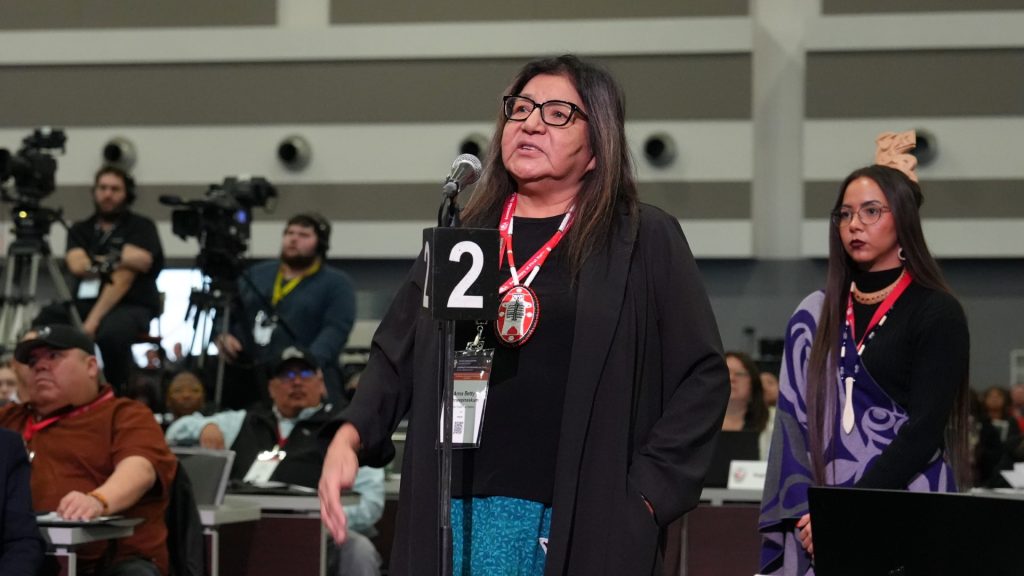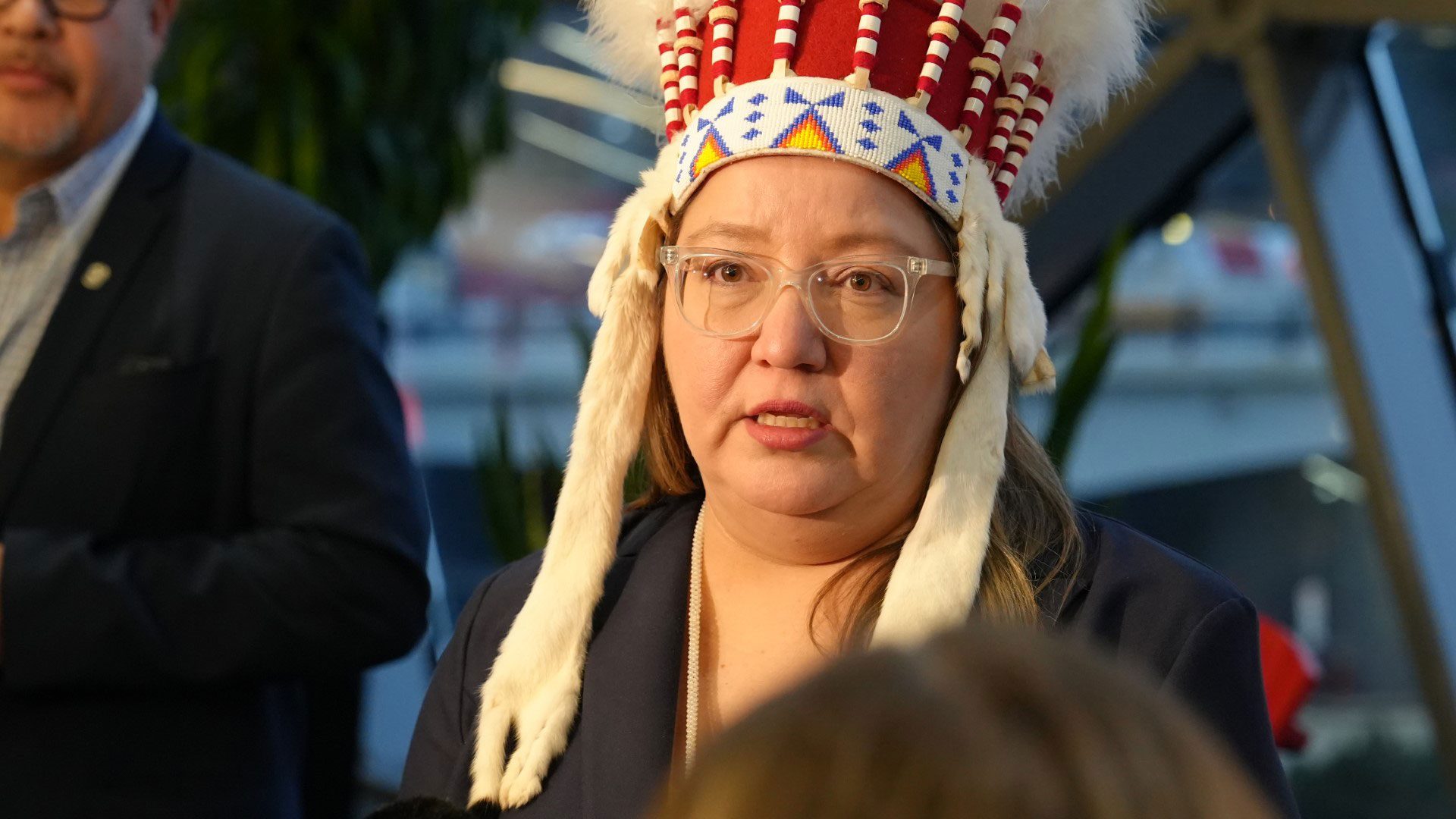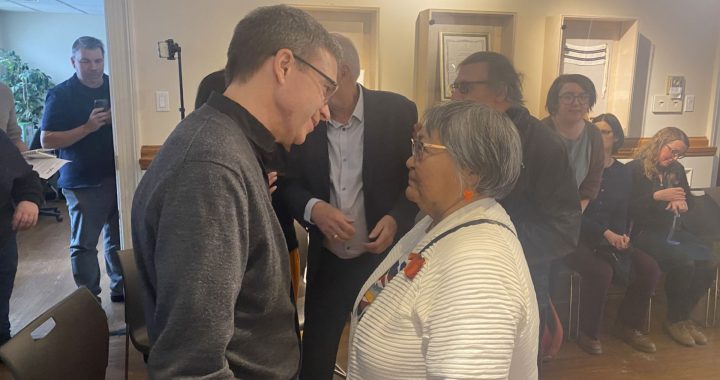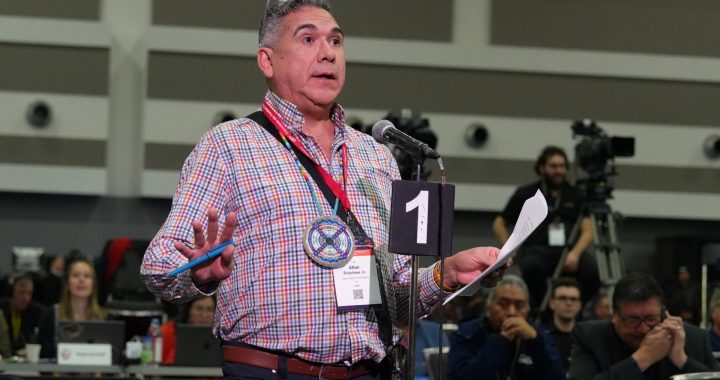
Anna Betty Achneepineskum speaking at the AFN assembly on Tuesday. Photo: Mark Blackburn/APTN.
The only Conservative player to accept an invitation to the Assembly of First Nations Special Chiefs Assembly in Ottawa is no longer scheduled to appear.
Anaida Poilievre, the spouse of Conservative leader Pierre Poilievre, was originally on the agenda for Wednesday morning to co-host a segment discussing human trafficking with advocate and country singer Paul Brandt.
But according to Nishnawbe Aski Nation Deputy Grand Chief Anna Betty Achneepineskum, a member of the AFN women’s council and a proxy for Marten Falls First Nation, it’s not happening.
“We’re grateful that Mrs. Anaida Poilievre changed her mind,” said Achneepineskum noting that there are many qualified First Nations people who could speak to the issue.
The Assembly of First Nations is meeting until Thursday.
The agenda for the assembly, which was updated Monday, showed Anaida Poilievre was scheduled to speak, at 9 a.m. It’s not clear when the circumstances changed, but by mid-morning on Tuesday Achneepineskum was asking that her name be removed from the agenda.
A spokesperson for the Conservative party said Tuesday morning that Anaida Poilievre would not be attending because she is ill.
Also notably absent from the agenda is her husband, Conservative party Leader Pierre Poilievre, who polls have consistently favoured to form the next federal government.
While a number of Liberal ministers, NDP leader Jagmeet Singh, and Bloc Québécois leader Yves-François Blanchet are on the agenda, no one from the Conservative party accepted an invitation to address chiefs at this week’s assembly.
Poilievre was invited, but his office did not respond to APTN’s inquiries about his absence.

National Chief National Chief Cindy Woodhouse Nepinak said she has reached out in the past to the Conservative leader to bring forward issues that are of concern to chiefs including policing.
“I’ve had dinner with him and his lovely wife in their home, with my husband,” she said. “And I think that it’s important to build relationships for First Nations and certainly talk about stuff like policing that needs to change in this country, and of course echoing that the relationship that was had by the conservative in the past is not acceptable.”
Poilievre has been paying more attention to First Nations in recent years. A search of Parliament’s Hansard in “Open Parliament” shows Poilievre only mentioned First Nations or Indigenous Peoples four times between 1994 and 2018. But since 2019 he has made 29 statements, mostly about economics and resource revenue-sharing agreements.
On his YouTube site, Poilievre has posted videos of his visits to Indigenous communities, including the Whitecap Dakota First Nation in Saskatchewan. In January 2023, he kicked off a consultation process that embraced ideas from the First Nations Tax Commission, particularly a model that provides First Nations more power to tax resource projects on their lands.
“Mr. Poilievre addressed our chiefs in July, and we will invite the conservatives again next July and we will continue to invite all political parties,” said Woodhouse Nepinak.
It was a mixed welcome, however, for the Conservative leader with seven veterans and one leader in the Two-Spirit community all turning their backs to show their disappointment with Poilievre for remarks he has made in the past about residential schools and gender issues, which they found offensive.
In 2008, on the eve of an apology to residential schools survivors from former prime minister Stephen Harper, Poilievre said residential school students need a stronger work ethic, not more money in a radio interview. He apologized for those comments shortly after.










